电子商务的基本模式和基本理论
电子商务的基本模式

电子商务的基本模式引言电子商务是指利用互联网技术进行商业活动的一种形式,它已经成为了现代商业发展的一大趋势。
电子商务的基本模式主要包括B2B、B2C、C2C和C2B四种。
本文将详细介绍这四种基本模式的概念、特点以及优缺点。
B2B模式B2B(Business-to-Business)模式是指企业与企业之间进行交易的模式。
在B2B模式中,企业通过互联网平台进行供应链的管理和交易。
该模式广泛应用于各个行业,包括制造业、批发业等。
B2B模式的特点是交易量大、交易金额较高,订单一般是大宗货物或服务。
B2B模式的优点包括: - 降低交易成本:通过互联网平台,企业可以减少人力资源和物流成本。
- 提高效率:B2B模式可以实现订单的自动化处理,提高交易的效率和准确性。
- 拓展市场:企业可以通过互联网平台,将产品和服务推广到全国甚至全球市场。
B2B模式的缺点包括: - 依赖供应链:B2B模式需要依赖可靠的供应链,如果供应链出现问题,可能会影响到企业的业务。
- 激烈竞争:B2B市场竞争激烈,企业需要不断提升产品和服务的质量,才能在市场中保持竞争力。
B2C模式B2C(Business-to-Consumer)模式是指企业与消费者之间进行交易的模式。
在B2C模式中,企业通过互联网平台,直接向消费者销售产品和提供服务。
该模式适用于零售业、服务业等。
B2C模式的特点是交易量较小、交易金额相对较低。
B2C模式的优点包括: - 便捷消费体验:消费者可以随时随地通过互联网平台购买产品和服务,提高了消费的便利性。
- 多样化选择:B2C模式下,消费者可以从众多不同的商家中选择产品和服务,满足个性化需求。
- 个性化推荐:通过互联网平台,企业可以根据消费者的偏好和历史购买记录,进行个性化推荐,提高销售效果。
B2C模式的缺点包括: - 物流配送:B2C模式需要考虑物流配送的问题,尤其在快递业景气时期,速度和准确性是关键因素。
- 建立信任:消费者对于在网上购物的信任度较低,企业需要通过诚信经营和售后服务来建立信任。
电子商务的基本模式(1)

2、电子商务以满足企业、商人和顾客的需 要为目的,增加(),改善服务质量, 降低交易费。
32
A交易时间 B贸易机会 C市场范围 D服务传递速度 3、电子商务实质上形成了一个()的市场
交换场所。 A在线实时 B 虚拟 C全球性 D网上真实
33
4、企业进行电子报关属于电子商务的() 模式。
4
2. 资金流、物流、信息流的形成
电子商务能够有效地利用有限的物质资源, 做到减少车辆空驶、货物积压以及产销不 对路等问题,同时交易的实时完成也极大 地方便了商品所有权的转移,从而达到优 化资金流和物流的目的。
5
3 资金流、物流、信息流的关系
由信息流提供及时准确的信息,由资 金流按照需求有计划地完成商品价值形态 的转移,由物流按照资金流的要求完成商 品使用价值即商品实体的转移过程,从而 使得“三流”分别构成了商务活动中不可 分割的整体,共同完成着商品流通的全过 程。
B2B电子商务通过互联网进行贸易,贸 易双方从贸易磋商、签订合同到支付等均通 过互联网络完成,整个交易完全虚拟化。 B2B交易的优势主要在于交易成本大大降低。
16
阶段2 B2C电子商务
1. B2C电子商务的概念与参与主体
B2C电子商务是企业通过Internet向个 人网络消费者直接销售产品和提供服务的 经营方式,即网上零售。
22
2. 拍卖平台方式
(1)网络拍卖的定义
网络拍卖指网络服务商利用互联网通信 传输技术,向商品所有者或某些权益所有人 提供有偿或无偿使用的互联网技术平台,让 商品所有者或某些权益所有人在其平台上独 立开展以竞价、议价方式为主的在线交易模 式。
23
(2)网络拍卖和传统拍卖的区别
电子商务的基本概念与模式

电子商务的基本概念与模式一、引言电子商务(Electronic Commerce,简称E-commerce)是通过互联网、计算机网络等信息技术手段进行的商务活动的统称。
随着互联网的普及和发展,电子商务在全球范围内得到了迅猛发展,成为推动经济增长的重要力量。
本文将介绍电子商务的基本概念和模式。
二、电子商务的基本概念2.1 电子商务的定义电子商务是指以电子手段进行商务活动的一种模式。
它通过互联网等信息技术平台,实现商品、服务、资金和信息等要素的流通和交换。
电子商务具有交易成本低、市场范围广、交易效率高等特点,改变了传统商务模式,对经济发展具有重要意义。
2.2 电子商务的特点电子商务具有以下几个特点: - 无时无地的交易:电子商务打破时空限制,随时随地进行交易。
- 全球化市场:互联网使得市场变为全球范围,商家和消费者可以进行跨国交易。
- 低交易成本:与传统的实体店相比,电子商务的交易成本更低,可以提高效率并降低价格。
- 个性化服务:通过互联网技术,商家可以根据用户的需求进行个性化定制和服务。
三、电子商务的模式3.1 B2C模式B2C(Business-to-Consumer)模式是指商家直接面向消费者销售产品或服务。
在这种模式下,商家通过自己的网站或第三方平台,向消费者提供商品信息、价格、支付方式等,并完成交易流程。
这种模式常见于在线购物网站、电商平台等。
B2C模式的优点是:商家直接与消费者联系,可以提供个性化的服务和产品推荐,消费者可以在家中方便地购买商品。
但同时也存在一些问题,如物流配送、售后服务等。
3.2 B2B模式B2B(Business-to-Business)模式是指不同企业之间进行的电子商务活动。
在这种模式下,企业通过互联网平台,向供应商或合作伙伴采购原材料、零部件或服务。
B2B模式主要应用于企业间合作、供应链管理等领域。
B2B模式的优点是:可以快速找到可靠的供应商,降低采购成本,提高采购效率。
电子商务的基本概念与模式
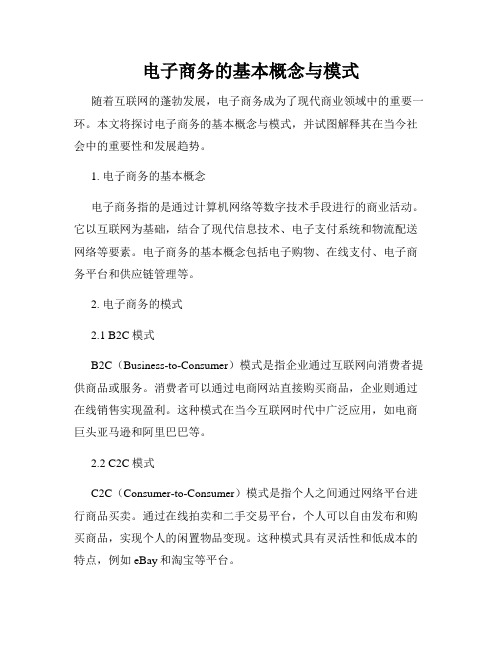
电子商务的基本概念与模式随着互联网的蓬勃发展,电子商务成为了现代商业领域中的重要一环。
本文将探讨电子商务的基本概念与模式,并试图解释其在当今社会中的重要性和发展趋势。
1. 电子商务的基本概念电子商务指的是通过计算机网络等数字技术手段进行的商业活动。
它以互联网为基础,结合了现代信息技术、电子支付系统和物流配送网络等要素。
电子商务的基本概念包括电子购物、在线支付、电子商务平台和供应链管理等。
2. 电子商务的模式2.1 B2C模式B2C(Business-to-Consumer)模式是指企业通过互联网向消费者提供商品或服务。
消费者可以通过电商网站直接购买商品,企业则通过在线销售实现盈利。
这种模式在当今互联网时代中广泛应用,如电商巨头亚马逊和阿里巴巴等。
2.2 C2C模式C2C(Consumer-to-Consumer)模式是指个人之间通过网络平台进行商品买卖。
通过在线拍卖和二手交易平台,个人可以自由发布和购买商品,实现个人的闲置物品变现。
这种模式具有灵活性和低成本的特点,例如eBay和淘宝等平台。
2.3 B2B模式B2B(Business-to-Business)模式是指企业之间通过互联网进行产品、服务和信息交流。
这种模式旨在实现供应链的协同和优化,提高合作效率和降低交易成本。
企业可以通过电商平台或在线招投标系统等渠道寻找供应商和采购商,实现商业合作。
2.4 O2O模式O2O(Online-to-Offline)模式是指线上与线下业务的结合。
通过互联网平台,企业向消费者提供线上服务和优惠,鼓励消费者线下到实体店面消费。
这种模式使得线上和线下业务相互促进,实现线上线下的互动。
3. 电子商务的重要性和发展趋势电子商务的发展给商业带来了巨大的变革和机遇。
其重要性主要体现在以下几个方面:3.1 全球市场的拓展电子商务打破了地域限制,使得企业可以在全球范围内进行销售和采购。
消费者也可以享受到全球商品和服务的便利。
电子商务的理论基础

电子商务的理论基础1. 引言随着信息技术的发展和互联网的普及,电子商务成为了当今商业领域不可忽视的一部分。
电子商务的成功离不开其理论基础的支持和指导。
本文将探讨电子商务的理论基础,包括电子商务的定义、分类、特点以及相关的理论模型等。
2. 电子商务的定义电子商务(Electronic Commerce)是指利用互联网、计算机网络和现代通信技术等电子手段,进行商业活动的过程。
它包括了在线购物、在线支付、在线金融等各种形式的电子交易。
3. 电子商务的分类根据参与主体的不同,电子商务可以分为以下几类:3.1 B2C(Business-to-Consumer)B2C是指企业通过互联网向个人客户销售产品或服务的电子商务模式。
在B2C模式下,企业作为卖方,通过在线商城或平台直接将产品或服务销售给个人消费者。
3.2 B2B(Business-to-Business)B2B是指企业间通过互联网进行交易的电子商务模式。
在B2B模式下,企业之间进行产品或服务的买卖,例如供应链管理、批发等。
3.3 C2C(Consumer-to-Consumer)C2C是指个人之间通过互联网进行交易的电子商务模式。
在C2C模式下,个人可以在在线市场上买卖自己的闲置物品或服务。
3.4 C2B(Consumer-to-Business)C2B是指个人向企业出售产品或提供服务的电子商务模式。
在C2B模式下,个人可以通过互联网向企业提供自己的专业技能或作为评估者向企业提供产品或服务的意见和建议。
4. 电子商务的特点电子商务与传统商务相比,具有以下几个特点:4.1 全球化电子商务打破了传统商务的地域限制,可以实现跨国交易。
消费者可以通过互联网购买世界各地的产品,企业也可以通过电子商务拓展全球市场。
4.2 便捷性电子商务为消费者提供了方便快捷的购物方式。
消费者只需要通过互联网访问在线商城,就可以随时随地浏览和购买商品,无需时间和地域的限制。
4.3 个性化电子商务能够通过消费者的历史购买记录和偏好,为其提供个性化的推荐和定制服务。
2024年电子商务概论学习心得总结(2篇)

2024年电子商务概论学习心得总结随着互联网技术的发展和普及,电子商务作为一种新型商业模式已经深入到我们的生活中。
在学习了《电子商务概论》这门课程后,我对电子商务的理论和实践有了更深入的了解和认识。
下面是我对2024年电子商务概论学习心得的总结:一、电子商务的概念和特点电子商务是指利用互联网和信息技术进行商品和服务交换的一种商业模式。
它有几个特点:全球化、网络化、实时性、个性化和交互性。
通过电子商务,消费者可以随时随地方便地购物,企业可以扩大销售渠道并提高效率。
二、电子商务发展历程电子商务起源于20世纪70年代的电子数据交换系统,经过几十年的发展,逐渐演化为现在的电子商务模式。
我学习了电子商务的四个发展阶段:加速生命周期、差异化市场、创新性渠道和个性化服务。
每个阶段都有不同的商业模式和技术工具。
三、电子商务的基本模式电子商务有多种基本模式:B2C模式(企业对消费者)、B2B模式(企业对企业)、C2C模式(消费者对消费者)、C2B模式(消费者对企业)和B2G模式(企业对政府)。
每种模式都有自身的特点和适用场景。
四、电子商务的关键成功因素在电子商务的学习中,我了解到了电子商务的关键成功因素:市场定位、价值创造、用户体验、品牌建设、物流配送和支付安全。
如果一个电子商务企业能够在这些方面做好,就能够在竞争激烈的市场中脱颖而出。
五、电子商务的管理和运营电子商务的管理和运营是一个复杂而庞大的系统工程。
它包括:网站建设和设计、在线营销、供应链管理、客户关系管理、数据分析和风险管理等方面。
一个成功的电子商务企业需要有专业的团队来运营和管理。
六、电子商务的挑战和问题电子商务也面临着一些挑战和问题,其中最主要的是网络安全问题、消费者隐私保护和诚信问题。
此外,电子商务还会影响传统零售业,一些企业需要转型和适应新的商业环境。
七、电子商务的未来趋势我认为,未来电子商务的发展将围绕着几个趋势展开:移动电子商务、社交电子商务、区块链技术、云计算和大数据应用。
电子商务的基本原则和运营模式
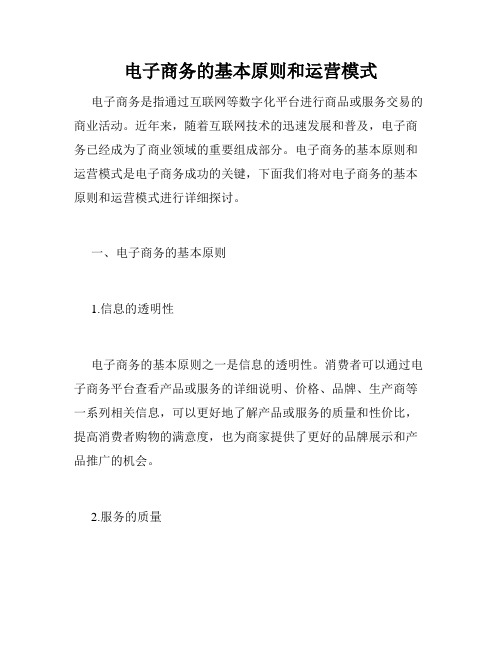
电子商务的基本原则和运营模式电子商务是指通过互联网等数字化平台进行商品或服务交易的商业活动。
近年来,随着互联网技术的迅速发展和普及,电子商务已经成为了商业领域的重要组成部分。
电子商务的基本原则和运营模式是电子商务成功的关键,下面我们将对电子商务的基本原则和运营模式进行详细探讨。
一、电子商务的基本原则1.信息的透明性电子商务的基本原则之一是信息的透明性。
消费者可以通过电子商务平台查看产品或服务的详细说明、价格、品牌、生产商等一系列相关信息,可以更好地了解产品或服务的质量和性价比,提高消费者购物的满意度,也为商家提供了更好的品牌展示和产品推广的机会。
2.服务的质量电子商务的另一个基本原则就是服务的质量。
服务的质量直接关系到消费者的购物体验和商家的口碑,影响着商家的销售额和品牌形象。
因此,商家必须提供优质、高效、可靠的服务,通过专业的客服团队、完善的物流体系、高品质的产品和服务,赢得消费者的信任和支持。
3.支付的安全性电子商务交易需要进行支付,因此支付的安全性也是电子商务的基本原则之一。
商家必须保证付款通道的安全可靠,并采用多种支付方式,为消费者提供更加便捷的支付方式。
同时,商家还需要保护消费者的支付信息,防范支付信息泄露和盗窃。
4.用户的隐私保护随着个人信息保护意识的提高,用户的隐私保护也成为电子商务的重要原则之一。
商家必须遵守相关隐私法律法规,保护消费者的个人信息安全,不得随意出售或泄露消费者的个人信息。
二、电子商务的运营模式1.商城式商城式是最常见的电子商务运营模式,商城网站销售的产品包括自有产品和第三方产品。
商城式电子商务模式对消费者和商家都有很大的吸引力,对商家来说可以提供丰富的销售渠道,对消费者来说可以方便的选择各种产品和服务。
2. C2C模式C2C模式也叫个人对个人电子商务模式(consumer-to-consumer)。
C2C模式适用于个人之间的交易,充分发挥了个人的优势,包括价格优势、创意优势等。
电子商务专业主要学什么

电子商务专业主要学什么电子商务专业是一门跨学科的综合性专业,它结合了信息技术、商务管理、市场营销、物流与供应链管理等多个领域的知识。
随着互联网技术的发展和全球经济一体化的推进,电子商务已经成为现代商业活动的重要组成部分。
电子商务专业的学习内容主要围绕以下几个方面展开:1. 电子商务基础理论:学生首先需要了解电子商务的基本概念、发展历程、主要模式和发展趋势。
这包括对电子商务的定义、分类、功能以及电子商务在现代商业中的作用和影响的深入理解。
2. 信息技术与网络技术:电子商务的运作离不开强大的信息技术支持。
因此,学生需要学习计算机网络、数据库管理、网页设计与开发、网络安全等技术知识,以确保能够熟练地运用这些技术进行电子商务活动。
3. 商务管理与市场营销:电子商务专业的学生还需要掌握商务管理的基本原则和市场营销的策略。
这包括学习市场分析、消费者行为、产品策略、价格策略、促销策略等,以便能够在电子商务环境中有效地进行商业活动。
4. 物流与供应链管理:电子商务的高效运作依赖于强大的物流和供应链管理。
学生需要学习物流管理的基本原理、供应链管理的流程和方法,以及如何通过电子商务平台优化物流和供应链。
5. 电子商务法律法规:随着电子商务的快速发展,相关的法律法规也在不断完善。
学生需要了解电子商务领域的法律法规,包括电子合同、电子支付、消费者权益保护、知识产权保护等方面的法律知识。
6. 电子商务实践操作:理论知识的学习需要通过实践来巩固和深化。
学生将通过模拟电子商务平台的操作、参与电子商务项目、进行电子商务创业实践等方式,将所学知识应用于实际工作中。
7. 跨文化交流与国际商务:在全球化的背景下,电子商务专业的学生还需要具备一定的跨文化交流能力和国际商务知识。
这包括学习国际贸易的基本原则、国际支付与结算、国际物流与供应链管理等内容。
通过上述学习内容的系统学习,电子商务专业的学生将能够掌握电子商务领域的专业知识和技能,为未来的职业生涯打下坚实的基础。
电子商务基本模式

电子商务基本模式电子商务是指通过互联网和其他电子手段进行商务活动的方式。
它的基本模式有多种,以下是其中的几种常见模式:1.电子商务平台模式:电子商务平台是指由一个或多个电子商务企业创建和管理的,为供应商和消费者提供交易和服务的平台。
供应商可在平台上展示和销售商品或服务,消费者通过平台、选择和购买商品或服务。
平台通常提供支付、物流、售后服务等支持,以促进供需双方的交流和交易。
2.C2C模式:C2C模式(Customer to Customer)是指消费者之间直接进行交易的模式。
平台提供一个在线市场,消费者可在上面创建在线店铺,展示并售卖自己的商品或服务。
其他消费者可以通过平台找到并购买这些商品或服务。
平台通常提供支付、评价、纠纷处理等功能,以保证交易的安全和可靠。
3.B2C模式:B2C模式(Business to Customer)是指企业向消费者直接销售产品或服务。
企业通过自己的网站或其他电子渠道展示和销售商品,消费者可以浏览并选择购买。
企业通常提供在线支付、物流配送、售后服务等支持,以提供方便快捷的购物体验。
4.B2B模式:B2B模式(Business to Business)是指企业之间通过电子渠道进行交易的模式。
企业可以在平台上进行供求信息的发布和,进行商务洽谈和交易。
这种模式可以简化采购过程、降低交易成本,并促进供应链的优化。
5.O2O模式:O2O模式(Online to Offline)是指在线和线下相结合的模式。
商家通过线上渠道进行产品宣传和销售,消费者可以在线上预订、支付,然后在线下门店体验或消费。
O2O模式可以提供便捷的线上购物体验和个性化的线下服务。
6.P2P模式:P2P模式(Peer to Peer)是指个体之间直接进行交易的模式。
通过互联网平台,人们可以共享闲置资源或通过出租、出售等方式进行交易。
P2P模式的典型例子是共享经济模式,如共享单车、共享办公室等。
以上是一些常见的电子商务基本模式,每种模式都有各自的特点和适用场景。
电子商务的基本模式与分类

电子商务的基本模式与分类电子商务(Electronic Commerce,简称e-commerce)指的是通过互联网等电子设备进行商务活动的模式。
随着互联网的普及和技术的发展,电子商务已成为商业领域的重要组成部分并对传统商业模式产生了重大影响。
本文将介绍电子商务的基本模式与分类。
一、电子商务的基本模式电子商务的基本模式可以分为B2C(Business-to-Consumer)、B2B (Business-to-Business)、C2C(Consumer-to-Consumer)和C2B (Consumer-to-Business)四种。
1. B2C模式B2C模式是指企业通过互联网向个人消费者销售产品或提供服务的商业模式。
在B2C模式下,企业将产品或服务直接推向终端消费者,消费者通过在线购物网站或企业自有网站进行购物。
B2C模式具有简单、直接、成本低等优势,并且为消费者提供了更多的选择和便利。
2. B2B模式B2B模式是指企业之间通过互联网进行交易和合作的商业模式。
在B2B模式下,企业通过电子商务平台进行供应链管理、采购、销售等活动。
B2B模式可以提高企业的效率和竞争力,降低交易成本,并且为企业间的合作提供了更大的机会和灵活性。
3. C2C模式C2C模式是指个人之间通过互联网进行交易和销售的商业模式。
在C2C模式下,个人可以在网上开设个人店铺,出售自己的产品或二手物品。
C2C模式具有庞大的用户基础和灵活的交易方式,促进了个人创业和消费者之间的互动。
4. C2B模式C2B模式是指个人通过互联网向企业提供产品或服务的商业模式。
在C2B模式下,个人可以通过自己的技能或资源向企业提供服务,例如自由职业者通过在线平台提供设计、写作等服务。
C2B模式为企业提供了更多的选择和灵活性,降低了成本并且能够更好地满足消费者的需求。
二、电子商务的分类根据电子商务的特点和应用范围,可以将电子商务分为多个分类。
1. 在线购物在线购物是电子商务中最为常见的形式,消费者通过在线商城或电商平台浏览和购买商品。
电子商务课程复习资料
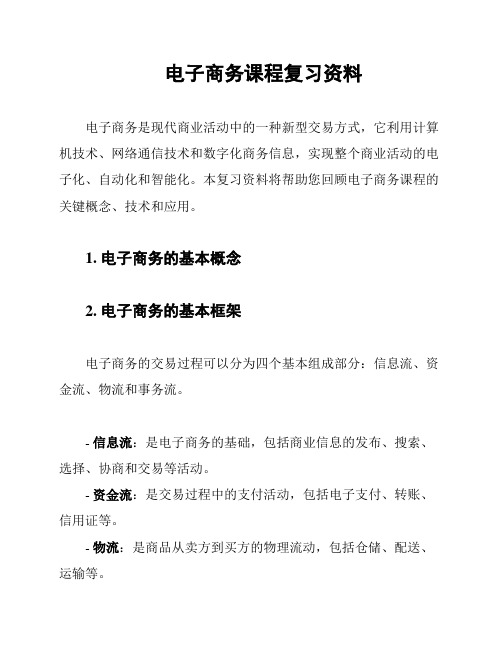
电子商务课程复习资料电子商务是现代商业活动中的一种新型交易方式,它利用计算机技术、网络通信技术和数字化商务信息,实现整个商业活动的电子化、自动化和智能化。
本复习资料将帮助您回顾电子商务课程的关键概念、技术和应用。
1. 电子商务的基本概念2. 电子商务的基本框架电子商务的交易过程可以分为四个基本组成部分:信息流、资金流、物流和事务流。
- 信息流:是电子商务的基础,包括商业信息的发布、搜索、选择、协商和交易等活动。
- 资金流:是交易过程中的支付活动,包括电子支付、转账、信用证等。
- 物流:是商品从卖方到买方的物理流动,包括仓储、配送、运输等。
- 事务流:涉及交易后的客户服务、订单跟踪、售后服务等。
3. 电子商务的技术基础电子商务的技术基础包括:- Web服务技术:如Web 2.0、3.0等,提供用户交互和数据的集成。
- 移动电子商务技术:通过智能手机、平板电脑等移动设备进行的电子商务活动。
- 安全技术:如SSL、SET等,保证交易数据的安全传输。
4. 电子商务的模式电子商务的主要模式包括:- B2B(企业对企业):企业间的电子商务活动,如阿里巴巴、中国制造网等。
- B2C(企业对消费者):企业直接向消费者销售商品或服务,如京东、淘宝等。
- C2C(消费者对消费者):消费者之间的在线交易平台,如闲鱼、eBay等。
- O2O(线上对线下):将线下的商务机会与互联网结合,如美团、大众点评等。
5. 电子商务的法律和道德问题电子商务的法律问题涉及网络安全法、合同法、知识产权法等。
道德问题包括隐私保护、数据安全、虚假广告等。
6. 电子商务的案例分析本部分将分析一些成功的电子商务案例,如阿里巴巴、京东、亚马逊等,探讨其商业模式、竞争优势和挑战。
复习建议1. 理论复习:回顾课程教材和笔记,加深对电子商务基本概念、技术和模式的理解。
2. 实践操作:参与电子商务平台的使用,如网上购物、支付等,增强实际操作能力。
3. 案例研究:分析电子商务的成功案例,学习其商业模式和创新策略。
电子商务的基础理论知识
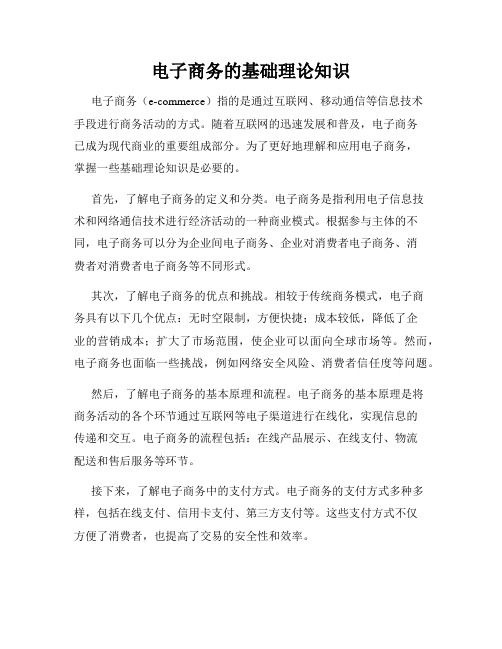
电子商务的基础理论知识电子商务(e-commerce)指的是通过互联网、移动通信等信息技术手段进行商务活动的方式。
随着互联网的迅速发展和普及,电子商务已成为现代商业的重要组成部分。
为了更好地理解和应用电子商务,掌握一些基础理论知识是必要的。
首先,了解电子商务的定义和分类。
电子商务是指利用电子信息技术和网络通信技术进行经济活动的一种商业模式。
根据参与主体的不同,电子商务可以分为企业间电子商务、企业对消费者电子商务、消费者对消费者电子商务等不同形式。
其次,了解电子商务的优点和挑战。
相较于传统商务模式,电子商务具有以下几个优点:无时空限制,方便快捷;成本较低,降低了企业的营销成本;扩大了市场范围,使企业可以面向全球市场等。
然而,电子商务也面临一些挑战,例如网络安全风险、消费者信任度等问题。
然后,了解电子商务的基本原理和流程。
电子商务的基本原理是将商务活动的各个环节通过互联网等电子渠道进行在线化,实现信息的传递和交互。
电子商务的流程包括:在线产品展示、在线支付、物流配送和售后服务等环节。
接下来,了解电子商务中的支付方式。
电子商务的支付方式多种多样,包括在线支付、信用卡支付、第三方支付等。
这些支付方式不仅方便了消费者,也提高了交易的安全性和效率。
还需了解电子商务的市场运作和发展趋势。
电子商务的市场运作模式主要有B2C、C2C和B2B等。
随着技术的进步和消费者需求的变化,电子商务也在不断发展。
移动电子商务、社交电子商务和跨境电子商务等新兴形式逐渐崭露头角。
此外,了解电子商务的法律法规和政策环境也是必要的。
不同国家和地区对电子商务有相应的法律法规和政策规定,了解并遵守这些规定对于企业的合法经营至关重要。
最后,了解电子商务的未来发展趋势。
随着技术的不断革新和市场需求的不断变化,电子商务的未来发展前景广阔。
人工智能、大数据分析、云计算等技术将进一步推动电子商务的创新和发展。
综上所述,掌握电子商务的基础理论知识对于理解和应用电子商务至关重要。
电子商务主要学什么内容
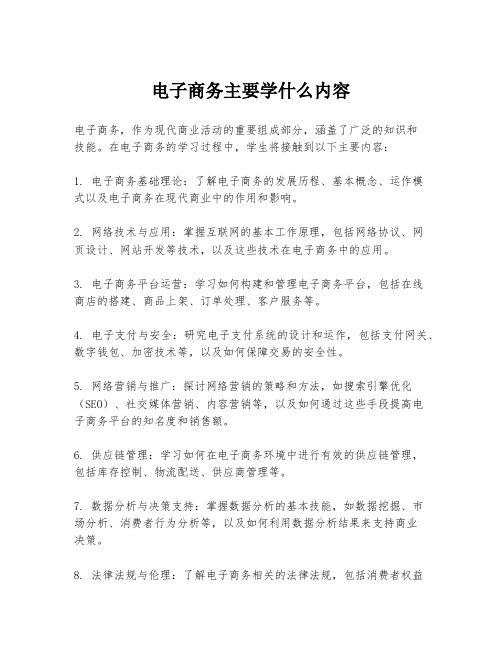
电子商务主要学什么内容电子商务,作为现代商业活动的重要组成部分,涵盖了广泛的知识和技能。
在电子商务的学习过程中,学生将接触到以下主要内容:1. 电子商务基础理论:了解电子商务的发展历程、基本概念、运作模式以及电子商务在现代商业中的作用和影响。
2. 网络技术与应用:掌握互联网的基本工作原理,包括网络协议、网页设计、网站开发等技术,以及这些技术在电子商务中的应用。
3. 电子商务平台运营:学习如何构建和管理电子商务平台,包括在线商店的搭建、商品上架、订单处理、客户服务等。
4. 电子支付与安全:研究电子支付系统的设计和运作,包括支付网关、数字钱包、加密技术等,以及如何保障交易的安全性。
5. 网络营销与推广:探讨网络营销的策略和方法,如搜索引擎优化(SEO)、社交媒体营销、内容营销等,以及如何通过这些手段提高电子商务平台的知名度和销售额。
6. 供应链管理:学习如何在电子商务环境中进行有效的供应链管理,包括库存控制、物流配送、供应商管理等。
7. 数据分析与决策支持:掌握数据分析的基本技能,如数据挖掘、市场分析、消费者行为分析等,以及如何利用数据分析结果来支持商业决策。
8. 法律法规与伦理:了解电子商务相关的法律法规,包括消费者权益保护、知识产权、隐私保护等,以及电子商务活动中的伦理问题。
9. 跨境电子商务:研究国际电子商务的运作模式,包括国际贸易规则、关税和税收政策、国际物流等,以及如何克服文化差异和语言障碍。
10. 创新与创业:鼓励学生探索电子商务领域的创新机会,学习如何将创意转化为商业计划,并了解创业过程中可能遇到的挑战和机遇。
通过这些内容的学习,学生将能够全面理解电子商务的各个方面,为将来在电子商务领域的工作或创业打下坚实的基础。
电子商务的定义及基本模式

电子商务的定义及基本模式什么是电子商务?电子商务(Electronic Commerce,简称e-commerce),指的是通过电子通信技术和互联网平台,将生产者和消费者联系起来,进行商品和服务的交易和信息传递的商业活动。
传统的商业模式需要在实体店面里面进行交易,而电子商务则是在虚拟的商业空间中进行。
在电子商务的模式下,商家和客户之间不需要面对面交易,可以直接进行线上交易。
相比传统的商业模式,电子商务的优点在于不受时间、空间、地域的限制,并且能够节省成本,提高效率,扩大市场规模。
电子商务的基本模式B2C模式B2C (Business-to-Consumer)是指商家直接向消费者销售商品和服务的模式,其中 B 指的是商家,C 指的是消费者。
这种模式是目前电子商务最常见的模式,主要应用于传统的零售业。
B2C 模式的优点是商家可以通过直接销售商品,获得更高的利润,同时消费者也可以通过网上购物获得更便利的购物体验。
B2B模式B2B(Business-to-Business)是指商家与商家之间的电子商务模式。
这种模式往往是在商业交易领域中应用较多。
B2B 模式的优点在于商家之间可以进行更有效的交流和合作,在不同公司之间共享资源,达到共同的商业目标。
C2C模式C2C(Consumer-to-Consumer)是指消费者通过电子商务平台进行商品和服务的交易。
这种模式通常使用拍卖网站或者社交网络平台进行。
C2C 模式的优点在于消费者之间可以交流和分享经验,也可以找到更便宜的商品。
O2O模式O2O(Online-to-Offline)是指将线上的商业模式和线下的实体服务相结合的模式。
这种模式通常应用于餐饮、娱乐和生活服务等领域。
O2O 模式的优点在于使消费者更方便地获得生活服务,同时也提高了实体商家的知名度和销售额。
B2G模式B2G(Business-to-Government)是指商家直接向政府机构销售商品和服务的模式。
电子商务的基础理论及其应用

电子商务的基础理论及其应用随着互联网技术的不断发展和普及,电子商务已成为人们生活中不可或缺的一部分。
简单来说,电子商务就是指通过互联网等技术手段进行商务活动的一种方式。
它的基础理论包括电子商务模式、电子商务平台以及电子支付等,这些理论可以帮助企业和个人更好地利用互联网进行商业活动。
一、电子商务模式电子商务模式是指企业利用互联网实现商业目标的一种商业模式,是电子商务的基础理论之一。
它主要包括B2B、B2C、C2C和C2B四种模式。
B2B指的是企业之间的电子商务交易,它是企业通过互联网等电子渠道进行产品或服务的购买和销售。
B2C是指企业与消费者之间的电子商务交易,它是利用互联网等电子渠道进行商品或服务的购买和销售。
C2C指的是消费者之间的电子商务交易,它是指消费者通过电子渠道(如淘宝、京东等电商平台)进行商品购买和销售。
C2B是指消费者对企业的电子商务交易,它是指消费者通过互联网等电子渠道向企业提供产品或服务。
不同的电子商务模式适用于不同类型的业务。
例如,B2B适用于批发领域,B2C适用于零售领域,C2C适用于二手市场,而C2B适用于知识付费领域等。
二、电子商务平台电子商务平台是实现电子商务的重要工具,它是企业将产品或服务通过互联网公开展示并交易的网站或移动应用。
电子商务平台包括自建平台和第三方平台两种。
自建平台是指企业自行建立的电子商务平台。
企业通过自建平台可以更好地掌握自己的经营业务,并提高客户信任度和品牌形象。
例如,京东、淘宝等电商平台就是自建平台。
第三方平台是指企业将产品或服务交由第三方电商平台进行销售的一种方式。
第三方平台有很多,如天猫、拼多多等,优点在于能够将企业的产品或服务推广到更多的客户群体,提高企业的曝光度和销售额。
三、电子支付电子支付是指通过互联网等电子渠道进行货币交易的一种方式,是实现电子商务的重要手段之一,也是电子商务的基础理论之一。
它可以使支付更便捷快捷,并且简化了支付的流程。
电子商务基本模式

电子商务基本模式在当今数字化的时代,电子商务已经成为商业领域中不可或缺的一部分。
它极大地改变了人们的购物方式和企业的经营模式。
电子商务的基本模式多种多样,每种模式都有其独特的特点和适用场景。
一、B2B 模式(Business to Business)B2B 电子商务模式是指企业与企业之间通过互联网进行产品、服务及信息的交换。
这种模式通常涉及到原材料采购、零部件供应、成品批发等业务。
例如,一家汽车制造企业可能会通过 B2B 平台从供应商那里采购钢材、轮胎、电子元件等零部件。
在B2B 模式中,交易的规模通常较大,交易流程相对复杂,需要涉及到合同签订、物流配送、质量检验等多个环节。
B2B 电子商务的优势在于能够降低企业的采购成本,提高采购效率,拓展市场渠道,增强企业之间的合作与交流。
同时,通过电子商务平台,企业可以更方便地获取市场信息,及时调整生产和销售策略。
二、B2C 模式(Business to Consumer)B2C 模式是企业直接面向消费者销售产品或服务的模式。
这是我们日常生活中最常见的电子商务模式,如淘宝、京东等电商平台上的众多商家。
在 B2C 模式中,企业需要注重消费者的购物体验,包括网站的设计、产品的展示、支付的便捷性、售后服务等方面。
消费者可以在网上浏览和比较各种商品,随时随地进行购买,享受便捷的购物服务。
对于企业来说,B2C 模式能够减少中间环节,降低销售成本,快速响应市场需求。
同时,通过大数据分析,企业可以更好地了解消费者的喜好和行为,进行精准营销和个性化推荐。
三、C2C 模式(Consumer to Consumer)C2C 模式是消费者之间通过电子商务平台进行交易的模式。
典型的例子如闲鱼、转转等二手交易平台。
在 C2C 模式中,个人卖家可以将自己闲置的物品或个人制作的产品进行出售,而买家可以根据自己的需求和预算进行选择。
这种模式为消费者提供了一个自由交易的平台,增加了商品的流通性和资源的利用率。
电子商务管理理论与模式

电子商务管理理论与模式随着互联网的普及和技术的进步,电子商务已经成为了当今商业领域中的重要组成部分。
电子商务管理理论与模式是这一领域的重要组成部分,它涉及到如何有效地管理电子商务业务,以确保其成功和可持续发展。
本文将探讨电子商务管理理论的主要概念和模式,并分析其在实际应用中的优势和挑战。
一、电子商务管理理论电子商务管理理论涉及到如何管理和协调电子商务业务的各个方面,以确保其高效、可靠和可持续性。
该理论的核心概念包括以下几个方面:1.客户关系管理(CRM)电子商务公司需要了解其客户的需求和偏好,以便提供更好的产品和服务。
CRM系统可以帮助公司收集和分析客户数据,以制定更有效的营销策略和个性化服务。
2.供应链管理电子商务公司需要有效地管理其供应链,以确保产品按时、按质到达客户手中。
有效的供应链管理包括库存控制、物流和配送等方面的协调。
3.支付与安全电子商务公司需要确保交易的安全性和可靠性,这涉及到支付方式、数据保护和隐私保护等方面。
公司需要与支付平台和安全机构合作,以确保客户数据的安全。
4.数据分析与优化电子商务公司需要收集和分析大量的数据,以了解其业务状况和客户需求,并制定更有效的战略和决策。
数据分析可以帮助公司优化业务流程,提高效率和降低成本。
二、电子商务管理模式电子商务管理模式涉及到如何组织和管理电子商务业务,以确保其高效、可靠和可持续发展。
该模式的核心包括以下几个方面:1.创新与快速响应电子商务公司需要不断创新,以满足客户的需求和偏好。
同时,公司需要快速响应市场变化,以保持竞争优势。
2.跨部门协作电子商务公司需要各部门之间的协作,以确保业务流程的高效性和顺畅性。
这包括销售、市场、物流、客服等部门之间的协作。
3.灵活的人力资源管理电子商务公司需要灵活的人力资源管理策略,以吸引和留住优秀的人才。
这包括提供具有竞争力的薪酬、良好的工作环境和职业发展机会等方面。
4.合作伙伴关系管理电子商务公司需要与供应商、物流合作伙伴和支付平台等建立良好的合作关系,以确保业务的高效性和可靠性。
电子商务的基础理论知识
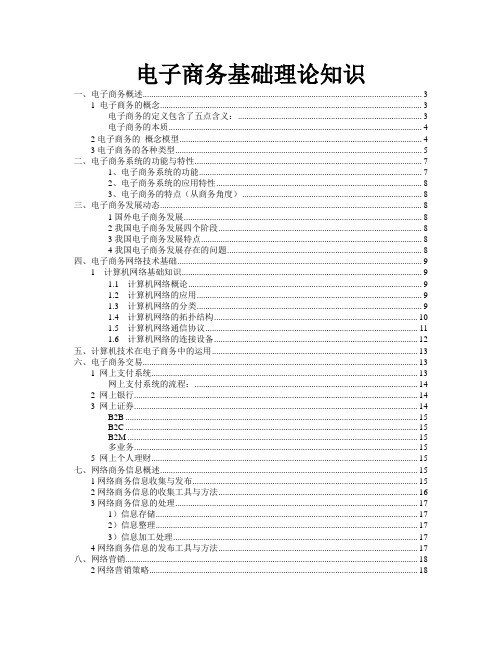
电子商务基础理论知识一、电子商务概述 (3)1 电子商务的概念 (3)电子商务的定义包含了五点含义: (3)电子商务的本质 (4)2电子商务的概念模型 (4)3电子商务的各种类型 (5)二、电子商务系统的功能与特性 (7)1、电子商务系统的功能 (7)2、电子商务系统的应用特性 (8)3、电子商务的特点(从商务角度) (8)三、电子商务发展动态 (8)1国外电子商务发展 (8)2我国电子商务发展四个阶段 (8)3我国电子商务发展特点 (8)4我国电子商务发展存在的问题 (8)四、电子商务网络技术基础 (9)1 计算机网络基础知识 (9)1.1 计算机网络概论 (9)1.2 计算机网络的应用 (9)1.3 计算机网络的分类 (9)1.4 计算机网络的拓扑结构 (10)1.5 计算机网络通信协议 (11)1.6 计算机网络的连接设备 (12)五、计算机技术在电子商务中的运用 (13)六、电子商务交易 (13)1 网上支付系统 (13)网上支付系统的流程: (14)2 网上银行 (14)3 网上证券 (14)B2B (15)B2C (15)B2M (15)多业务 (15)5 网上个人理财 (15)七、网络商务信息概述 (15)1网络商务信息收集与发布 (15)2网络商务信息的收集工具与方法 (16)3网络商务信息的处理 (17)1)信息存储 (17)2)信息整理 (17)3)信息加工处理 (17)4网络商务信息的发布工具与方法 (17)八、网络营销 (18)2网络营销策略 (18)搜索引擎营销 (18)电子邮件营销 (18)即时通讯营销 (19)病毒式营销 (19)博客营销 (19)RSS营销 (19)SN营销 (19)创意广告营销 (20)知识型营销 (20)事件营销 (20)口碑营销 (20)3网络营销中的客户管理手段 (20)1)树立正确的经营理念 (20)2)高层管理者支持和参与 (20)3)引入各种技术手段 (21)4)聘资深管理咨询公司 (21)5)提高产品内在价值 (21)与电子商务关系 (21)九、电子商务安全基础 (22)1电子商务面临的安全问题 (22)2电子商务安全技术 (22)A加密技术。
电子商务理论

电子商务理论一、电子商务理论1、电子商务(e_Commerce)概念:电子商务是指通过电子介质(如电脑、互联网以及其他的电子设备)在网络商店中进行商业活动的行业。
它可以帮助企业和消费者以一种简单、有效的方式来进行交易,提升企业经营及消费者购物体验。
2、电子商务模式:电子商务模式是流通模式的一个新型,它可以把网上购物归纳为前、中、后三个部分。
前:表示网上营销,网上广告,品牌宣传;中:指商品网上显示和拍卖;后:指订单管理、运输和客户服务等。
3、电子商务的功能:电子商务的功能有节省成本、提高效率、提升客户体验、打开新市场、吸引新客户。
通过有效地应用电子商务,公司可以在短时间内扩大企业的影响力,提高客户的反馈速度和市场反应力,并增进客户的满意度。
4、电子商务存在的问题:虽然电子商务在便利性和效率性上有所提高,但是早期电子商务存在安全性、可靠性、数据分析等方面的问题,导致国内外有很多消费者在网购时会陷入各种风险,而消费者数量也不断增加,带来了诸多挑战。
二、电子商务发展趋势1、移动电子商务:随着手机技术日新月异,移动电子商务拓展了电子商务空间,能够帮助企业更加方便的使用。
它的发展方式大体分为移动搜索引擎和移动社交网络两大部分。
移动搜索引擎不仅可以让用户更快捷更彻底的获得所需信息,并能准确地为企业提供有价值的反馈,帮助企业更好地管理业务。
2、云电子商务:伴随着云技术的发展,云电子商务的出现也让电子商务的发展变得更加便利,因为它可以节省传统电子商务系统及管理费用,可以更快捷的进行商品的上下架,可以方便的与社交媒体进行整合,可以重新定义电子商务的使用者及消费者的渠道,大大提升了企业的经营效益和客户服务水平。
三、电子商务发展战略1、完善网站设计和技术应用:使企业网站真正变形为全网络推广营销的核心,提高网站的可视性、交互性和易用性。
2、完善数据分析方法:数据分析作为电子商务的核心技术,需要企业搭建一套完善的使用数据分析的系统,以期让企业可以迅速形成电子商务市场经济系统,有效帮助企业在营销推广方面带来更大的效益。
电子商务理论基础

电子商务理论基础电子商务理论基础随着互联网技术的不断发展,电子商务已成为现代商业领域中不可或缺的一部分。
本文将从电子商务的概念、特点、理论基础和实际应用等方面,全面介绍电子商务的理论基础。
一、电子商务的概念和特点电子商务是指利用互联网技术进行商业活动的一种新型商业模式。
它包括互联网营销、电子交易、在线支付、物流配送等多个环节,实现了商品或服务的交易、支付和配送的自动化和无纸化。
电子商务具有以下特点:1、全球性:电子商务不受地域限制,可以面向全球市场。
2、开放性:电子商务的开放性使得企业可以与外部世界进行更加广泛和深入的联系。
3、实时性:电子商务的交易过程可以实时完成,提高了交易的效率。
4、个性化:电子商务可以根据客户需求提供个性化的产品和服务。
5、低成本高效率:电子商务可以降低交易成本,提高交易效率。
二、电子商务的理论基础电子商务的理论基础包括以下几个方面:1、网络营销:电子商务利用网络营销手段,通过网站建设、搜索引擎优化、社交媒体推广等方式,吸引潜在客户,提高产品或服务的知名度和销售量。
2、电子交易:电子商务通过电子交易平台,实现买卖双方的在线交易,包括B2B、B2C等模式。
电子交易需要保证交易的安全性和可靠性,防止欺诈和假冒行为。
3、在线支付:电子商务通过在线支付平台,实现网上支付和结算的自动化和无纸化。
在线支付需要保证支付的安全性和便捷性,防止欺诈和非法交易。
4、物流配送:电子商务通过物流配送系统,实现商品的快速配送和交付。
物流配送需要保证配送的准确性和及时性,提高客户满意度。
5、知识管理:电子商务通过知识管理,对客户数据进行挖掘和分析,了解客户需求和行为,提供更加精准和个性化的服务。
三、电子商务的实际应用电子商务在实际应用中已经取得了巨大的成功。
以下是一些典型的电子商务应用:1、网上商城:如淘宝、京东等,提供了一个在线的商品销售平台,消费者可以在线购买各种商品。
2、在线旅游:如携程、去哪儿等,提供了一个在线的旅游服务平台,消费者可以在线预订机票、酒店等服务。
- 1、下载文档前请自行甄别文档内容的完整性,平台不提供额外的编辑、内容补充、找答案等附加服务。
- 2、"仅部分预览"的文档,不可在线预览部分如存在完整性等问题,可反馈申请退款(可完整预览的文档不适用该条件!)。
- 3、如文档侵犯您的权益,请联系客服反馈,我们会尽快为您处理(人工客服工作时间:9:00-18:30)。
电子商务的基本模式和基本理论——电子商务下的管理理论创新企业管理9927班刘笑摘要本文在阐述企业管理任务由传统管理向注重企业人力资源、信息资源、客户关系管理和物流管理、供应链管理的转变的基础上,研究企业运用电子商务进行管理创新的过程之中,在知识、供应链、库存、生产流程、客户关系、财务、人力资源和全面企业管理等方面的管理创新。
在企业管理理论的动态创新过程中,企业应与客户在网络上直接交流,对客户需求做出快速响应,并为客户提供高质量的个性化服务,以适应新世纪复杂多变的国际环境的挑战,在发展中求得生存空间。
关键字电子商务管理理论管理创新ABSTRACTSThe enterprise management mission has changed from tradition management to paying attention to enterprise manpower resources, information resources, customer relation manage, material flow manage and the management of supply chain. On the basis of expounding the transitions, this text studies the management innovation in knowledge, supply chain, stock, producing the flow, customer's relation, financial affairs, manpower resources and overall business administration, during studying the innovation of using e- business. While the trends of the management theory of the enterprise are innovative, the enterprise needs to communicate with the customer directly in the network, respond customer's demand fast, and offer the high-quality individualization service, in order to adapt to the challenge of the complicated and changeable international environment in the new century, thus could try to achieve the living space.Keywords: e- businessmanagement theorymanagement innovation目录摘要 (I)目录 (II)一、引言........................................................................................................... 11.问题的提出......................................................................................... 12.研究思路与方法................................................................................. 13.文章结构与目标................................................................................. 1二、我国企业管理任务的转变....................................................................... 21.由传统管理向注重企业人力资源的转变......................................... 22.由传统管理向注重企业信息资源管理的转变................................. 23.由传统管理向注重客户关系管理和物流管理的转变..................... 24.由传统管理向供应链管理的转变..................................................... 2三、我国企业管理创新................................................................................... 31.企业管理知识创新............................................................................. 32.企业供应链管理创新......................................................................... 33.企业生产流程管理创新..................................................................... 34.企业客户关系管理创新..................................................................... 45.企业库存管理创新............................................................................. 46.企业财务管理创新............................................................................. 47.企业人力资源管理创新..................................................................... 4四、结论........................................................................................................... 5参考文献:....................................................................................................... 5电子商务的基本模式和基本理论——电子商务下的管理理论创新一、引言1.问题的提出电子商务的兴起,不仅改变了传统贸易方式和营销渠道,也使企业、消费者和政府之间的业务关系和管理模式面临着新的变革。
电子商务推动着企业的管理由传统的管理模式向电子商务管理模式转变。
我国企业在实施电子商务过程中,电子商务与管理创新是相辅相成的,因此研究企业如何运用电子商务促进管理创新,以及企业如何实行管理创新更好地推动电子商务的应用和发展成为一个十分重要的课题。
2.研究思路与方法本文在阐述企业管理任务转变的基础上,研究企业在运用电子商务进行管理创新的过程之中,在知识、供应链、库存、生产流程、客户关系、财务、人力资源和全面企业管理等方面的管理创新,并得出结论。
通过逐层分析电子商务下企业经营模式的变化,推出管理任务变化的内容,并多角度归纳出管理创新的内涵。
3.文章结构与目标本文第一部分主要说明企业由传统管理向注重企业人力资源、企业信息资源、客户关系管理和物流管理、供应链管理的转变;第二部分主要论述企业知识、供应链、生产流程、客户关系、库存、财务和人力资源管理的创新;第三部分得出结论,企业的管理理论只有在动态的创新过程中,企业才能适应新世纪复杂多变的国际环境的挑战,才能在发展中求得生存空间。
文章旨在指明企业应与客户在网络上直接交流,对客户需求做出快速响应,并为客户提供高质量的个性化服务,根据市场信息随时调整自己的营销战略规划。
总之,在电子商务下企业应努力实现信息的整合与管理市场开发,以及提供高质量的客户服务。
二、我国企业管理任务的转变1.由传统管理向注重企业人力资源的转变在传统的管理体制下,企业管理的内容分为对人的管理和对物的管理,而对人的管理则侧重与合理调配人力资源、调动企业职工的积极性。
在网络时代,人力资源管理将直接影响企业的经营效果,如何吸引优秀人才、合理安排人力资源、降低人员成本、提高企业竞争力已经成为企业管理者考虑的首要问题。
能冒风险、勇于创新的人才是网络时代最需要的财富,企业要获得成功应留下它最优秀的人才。
2.由传统管理向注重企业信息资源管理的转变在传统的管理环境下,企业资本的管理主要是合理安排企业的固定资产和流动资产,充分利用它们,是企业的资本能最大限度地得到发挥。
在电子商务环境下,决定企业发展的更重要的资本就是企业的信息资源。
信息的使用可以增值,传播不受时空限制,借助网络,可以瞬间传达到世界各处。
3.由传统管理向注重客户关系管理和物流管理的转变通过客户关系管理建立一对一的网络营销不但可以将网络营销的固有优势发挥到极至,更可通过网际的交流,与用户建立起历久弥坚的关系。
如果企业能在很好规划运作内部资源的同时,整合其所具有的外部资源,如供应商、代理和承运商等,将提高其生产、采购以及交货计划的准确性,从而在快速应对市场的同时,提高对客户销售及服务承诺的准确性,提高客户满意度。
物流管理是企业对来自客户和有关客户的信息提炼成具体的制造和采购计划,通过物流网络设计、物流信息合成、运输管理、存货管理、仓储管理等协调活动来实现。
物流管理的目标是:快速反应、最小变异、最低库存、整合运输、产品质量以及生命周期支持等。
4.由传统管理向供应链管理的转变通过供应链管理可以优化流通网络与分销渠道、减少库存量、加快库存周转来改进供应链,有关客户需求的实时信息及时反馈回供应链,对顾客反映的及时响应,给予顾客想要得到的东西,供应链成为差别化竞争优势的一个重要来源。
现代供应管理的核心是通过客户和供应商网络进行有效的协作,这将基于对电子商务手段的有效应用,信息的质量将比以往更加重要。
